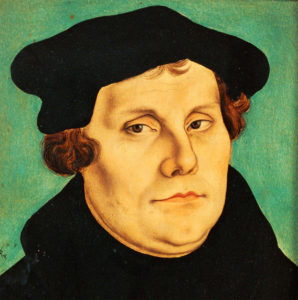This month will mark the 500th anniversary of the Reformation. To learn more about the Reformation and its impact on modern culture, eleven students from a variety of majors and classes will travel to Germany and follow Martin Luther through the cities in which he lived, from Eisenach and Erfurt to Wittenburg, the site where he posted his 95 theses.
 “My hope is that students will learn more about Luther and his ideas through our coursework and that this will be enriched and come alive by the opportunity to visit some of the places where he lived and worked,” expressed Peter Meilaender, professor of political science, who is teaching the “Luther as a Political Thinker” class. He continued, “The effects of a historical event like the Reformation are so deep and broad that five centuries later we are probably hardly even conscious of the ways it has shaped our culture. The individualism that is such a prominent feature of modern Western societies surely has important roots in the Reformation.”
“My hope is that students will learn more about Luther and his ideas through our coursework and that this will be enriched and come alive by the opportunity to visit some of the places where he lived and worked,” expressed Peter Meilaender, professor of political science, who is teaching the “Luther as a Political Thinker” class. He continued, “The effects of a historical event like the Reformation are so deep and broad that five centuries later we are probably hardly even conscious of the ways it has shaped our culture. The individualism that is such a prominent feature of modern Western societies surely has important roots in the Reformation.”
“I think understanding even the basics of the Reformation helps to understand a lot about culture in the West,” agreed Carolyn Case ’19, who will be taking the trip to Germany. “I talked with someone over the summer who hadn’t heard of the Reformation and had no idea who Martin Luther was (as opposed to King Jr.) but was apparently ‘a sincere Baptist.’ She admitted that she had just taken Protestantism for granted and assumed it had always existed.”
Meilaender also spoke to the impact of the Reformation, specifically its influence on Western culture. “Here in the United States, dissenting protestant sects profoundly shaped the early political culture of many colonies,” he said. “It was in that atmosphere of religious pluralism that an idea we take for granted, the separation of church and state, came to seem normal. Even the typically Western belief in the possibility of historical progress has something to do with an attitude of permanent ‘reformation’ in society.”
The Reformation also boasts strong connections to capitalism and modern science, key influences in modern Western society. “Although his thesis about the Protestant work ethic has come to be questioned by many scholars,” Meilaender said,
“Max Weber and others long ago recognized that capitalism and modern science both seemed to take hold most rapidly and thoroughly in the northern European countries that had been most affected by the Reformation.”
Dean of the Chapel Michael Jordan recognized the Reformation’s essential importance while also speaking to its cost. “The Reformation, from a Protestant perspective, reminded the church of such important truths at a critical time,” he said. “Yet there is more than a tinge of sadness: with even evangelical Protestants realizing the importance of church unity, there is certainly a sense of lament that the Reformation accelerated the Church’s splintering into denominations and factions as we see today.”
“We tend to read Luther now as a brave maverick who bucked tradition in order to cling to something he knew was true, even when people pushed back against him” Dean Jordan added. “We continue to lionize Christian leaders like this, but it’s hard for us to read faithful members of church bodies who learn in submission as similarly holy. This is a mixed bag for us: because we have a hard time seeing the value in being part of the Church, we have a hard time seeing the value of belonging to individual congregations. And that has its cost!”
On November 1st, the day following the 500th anniversary of Luther posting his 95 theses, Professor Jonathan Case will speak on the Reformation in chapel.
